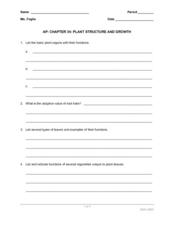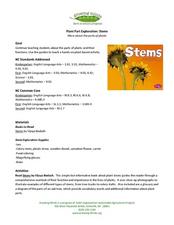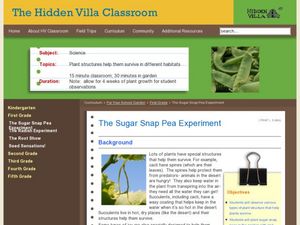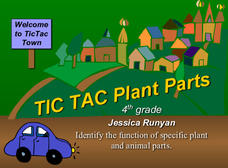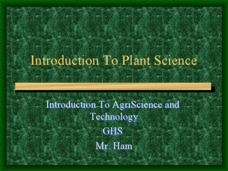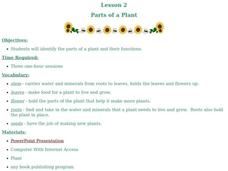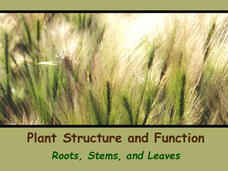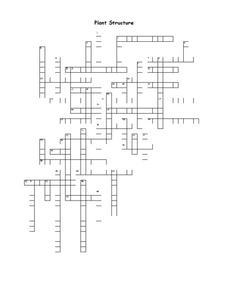Curated OER
AP: Chapter 35: Plant Structure and Growth
A straightforward learning exercise has botanists list plant organs and functions, plant cell organelles and their functions, specialized plant tissues and their functions. Three high-quality diagrams are displayed for them to label as...
Cornell University
Plant Cell Crime Scene
Use science to solve the mystery of the Poplar murder. Pupils use forensic botany to determine if a suspect could be the killer. By analyzing images from a Transmission Electron Microscope, learners determine if the material found on the...
Curated OER
Plant Part Exploration: Stems
Explore water transport in plant stems using this fun experiment! Your scientists will start by reading Stems by Vijaya Bodach. Then, activate prior knowledge about plant stem functions and water transportation....
Curated OER
Leaves
In this biology worksheet, students write identify the different parts of a leaf shown in 5 different diagrams. They also complete 12 short answer questions after reading the information about leaves.
Curated OER
The Sugar Snap Pea Experiment
Students examine types of plant structure. In this plant biology lesson, students observe various types of plants, such as ivy and grapes, and discuss the differences in structure. Additionally, students plant sugar snap peas, using a...
Curated OER
Tic Tac Plant Parts
This plant biology PowerPoint introduces plant parts and their functions. This PowerPoint allows students to identify each plant part on a diagram, along with its' function. The slides contain a clear explanation of how each plant part...
Curated OER
What Parts of a Plant Do We Eat?
Did you know that tomtoes and cucumbers are actually fruits? Biology or botany beginners read about the function of flowers and fruit and find that some food items commonly called vegetables are, by definition, also fruits! Give learners...
Curated OER
Introduction to Plant Science
Although the formatting is less than perfect and some of the pictures are blurry, the information in this presentation on plants is pertinent. Viewers will be able to compare and contrast plants with animals. They will learn about...
Curated OER
Using Plant Pigments to Link a Suspect to a Crime
Students use chromatography to separate plant pigments collected from a fictitious crime scene and suspects. They compare the Rf values of the plant pigments to determine whether the plant pigments found on any of the suspects match the...
Curated OER
What is a Plant?
For this plant characteristics worksheet, students will read a paragraph about plants and then use the information found in that paragraph to complete 3 short answer questions about plant adaptations.
Curated OER
Plant Diseases
In this plant biology worksheet, students take a walk in the woods to write down signs of plant diseases. Students draw pictures of sick plants they observed and identify the number of different symptoms found. This is a three question,...
Curated OER
Parts of a Plant
Students identify the parts of a plant and their functions. In this plant biology lesson, students view a PowerPoint presentation on plants and their parts and discuss the functions of each part. Students observe a real plant and...
Curated OER
Tops and Bottoms
First graders classify vegetables by which parts are edible. In this plant biology lesson, 1st graders are read Tops and Bottoms by Janet Stevens, participate in a discussion of which plant parts are edible in the story, then sort...
Nuffield Foundation
Measuring Rate of Water Uptake by a Plant Shoot Using a Potometer
How quickly does a plant transpire? Learners explore this question through measuring water uptake with a potometer. They time the movement of a bubble a set distance to understand the motion and rate of speed.
Biology Junction
Plant Structure and Function: Roots, Stems, and Leaves
Scientists found fossils of plants more than 420 million years old—but plants existed for up to 100 million years prior to these fossils. Learn about the importance of plants to the entire planet. Viewing a presentation helps scholars...
Curated OER
Roots, Stems, and Leaves
For this plant worksheet, students review the structure and function of roots, stems, and leaves. This worksheet has 5 matching, 7 true or false, 4 multiple choice, and 10 fill in the blank questions.
Curated OER
Plant Transpiration
High schoolers conduct various experiments to investigate plant transpiration. In this biology instructional activity, students explain how this process helps maintain the hydrologic cycle. They measure the rate of water loss in plants...
Curated OER
Plant Needs
Students explore the needs of plants. In this plants biology lesson, students work in groups to perform an experiment with tomato plants. Each group records observations in a journal, takes pictures, and interprets the...
Curated OER
Look At Those Leaves
Students observe leaves. In this plant biology lesson, students examine leaves and classify them according to size, shape, and color. Students learn more about the leaves by visiting suggested websites.
Curated OER
Look at Those Leaves!
Students observe and sort tree leaves. In this plant biology lesson, students observe various types of leaves and identify the characteristics of each leaf. Students measure and sort leaves according to size and color.
Curated OER
Look At Those Leaves!
Students sort tree leaves. In this plant biology lesson, students collect leaves and group them according to size, shape, and color. Students discuss their observations.
Curated OER
Plant Structure and Function
With a few minor formatting changes, the plant parts and processes resource here would make a great study guide, quiz, or self assessment. Currently, it is a bit confusing, but changing some lettering to numbering would clear up any...
Curated OER
Plant Structure
In this plant science worksheet, students complete a crossword puzzle with 48 questions. They identify the different parts of a plant.
Curated OER
Parts of a Plant
Students explore biology by listening to an in-class lecture. In this plant science lesson, students sing songs with their classmates regarding anatomical parts of a plant and create plants from arts and crafts materials. Students listen...


